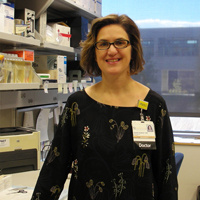
Gering, NE.
How/when did you become interested in science and/or medicine?
I always enjoyed my science classes throughout junior high, but my love of science really became apparent in high school during my physiology classes. This was further emphasized during my undergraduate anatomy and chemistry classes. I also had wonderful medical experiences as a child born with a cleft lip and cleft palate who underwent several surgical repairs. I think the admiration I had for my physician helped spark my interest in medicine.
When did you join the University of Iowa faculty?
July 2011
How or why did you choose to join the faculty at the University of Iowa?
I chose to join the University of Iowa faculty because I truly felt there was a balance of providing clinical care and support for my academic interests. Additionally, the pediatric faculty and the multidisciplinary team in the PICU made me feel welcome and supported.
Is there a teacher or mentor who helped shape your career?
I am fortunate to have several wonderful mentors that have shaped my career. My mentors in pediatric critical care have shaped my clinical practice. I also had outstanding research mentors that provided opportunities early on in my training which definitely influenced my faculty academic interests.
How do you see your faculty role impacting medicine and/or science?
Being at a large academic setting, I think one of the most important ways I impact medicine is through the training of our future healthcare providers.
What is the biggest change you've experienced in your field since you were a student?
In pediatric critical care, I think we are continuing to push the envelope in delivering health care. We are applying advanced technologies more frequently and to broader patient populations than when I was a student. Innovative, collaborative research is being performed which not only focuses on unraveling complex pathophysiology but also on using research to personalize medicine. Finally, we are more focused on delivering care which addresses the goals and desires of patients and their families.
What one piece of advice would you give to today's students?
I tell students to always remember their reasons for pursuing medicine. This passion for medicine helps you get through the challenging times that arise during your training and your faculty career.
In what ways are you engaged in professional activities outside the University (i.e. population based research, mentoring high school students, sharing your leadership/ expertise with organizations or causes, speaking engagement off campus, etc.)?
I have had the opportunity to serve as council member in a regional organization promoting pediatric research and lead our center’s involvement in a national quality improvement project focused on CPR delivery in the PICU.
What are some of your outside (personal) interests?
I love spending time with family and friends, watching college football, and traveling.